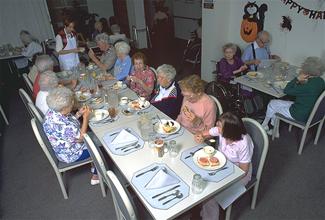Last Updated on January 31, 2024
Eating is one of life’s pleasures, but some people lose interest in eating and cooking as they get older. They may find that food no longer tastes good. They may find it harder to shop for food or cook, or they don’t enjoy meals because they often eat alone. Others may have problems chewing or digesting the food they eat.
Why Not Eating Can Be Harmful
If you don’t feel like eating because of problems with chewing, digestion, or gas, talk with your doctor or a registered dietitian. Avoiding some foods could mean you miss out on needed vitamins, minerals, fiber, or protein. Not eating enough could mean that you don’t consume enough nutrients and calories.

Problems With Taste or Smell?
One reason people lose interest in eating is that their senses of taste and smell change with age. Foods you once enjoyed might seem to have less flavor when you get older. Some medicines can change your sense of taste or make you feel less hungry. Talk with your doctor if you have no appetite, or if you find that food tastes bad or has no flavor.
If you don’t feel like eating because food no longer tastes good, you can enhance the flavor of food by cooking meals in new ways or adding different herbs and spices.
Problems Chewing?
If you have trouble chewing, you might have a problem with your teeth or gums. If you wear dentures, not being able to chew well could also mean that your dentures need to be adjusted. Talk to your doctor or dentist if you’re finding it hard to chew food.
Chewing problems can sometimes be resolved by eating softer foods. For instance, you could replace raw vegetables and fresh fruits with cooked vegetables or juices. Also, choose foods like applesauce and canned peaches or other fruits.
Meat can also be hard to chew. Instead, try eating ground or shredded meat, eggs, or dairy products like fat-free or low-fat milk, cheese, and yogurt. You could also replace meat with soft foods like cooked beans and peas, eggs, tofu, tuna fish, etc.
Problems with Digestion?
If you experience a lot of digestive problems, such as gas or bloating, try to avoid foods that cause gas or other digestive problems. If you have stomach problems that don’t go away, talk with your doctor. If you do not have an appetite or seem to be losing weight without trying, talk to your doctor or ask to see a registered dietitian.

Try New Dishes
Making small changes in the way you prepare your food can often help overcome challenges to eating well. These changes can help you to enjoy meals more. They can also help make sure that you get the nutrients and energy you need for healthy, active living.
- Look for ways to combine foods from the different food groups in creative ways. You can do this while continuing to eat familiar foods that reflect your cultural, ethnic, or family traditions.
- Experiment with regional dishes or vegetarian recipes.
- Try out different kinds of fruits, vegetables, and grains that add color to your meals.
- Make sure your foods are seasoned well, but not with extra salt. Try using lemon juice, vinegar, or herbs to boost the flavor of your good.
- Try new recipes from friends, newspapers, magazines, television cooking shows, or cooking websites.
- Find recipes online. Type the name of a food and the word “recipes” into a search window to look for ideas.
- Take a cooking class to learn new ways to prepare meals and snacks that are good for you. Grocery stores, culinary schools, community centers, and adult education programs offer these classes.
Eat With Others
Eating with others is another way to enjoy meals more. For instance, you could share meals with neighbors at home or dine out with friends or family members. You could also join or start a breakfast, lunch, or dinner club.
Many senior centers and places of worship host group meals. You might also arrange to have meals brought to your home.

When Eating Out
When you eat out, you can still eat well if you choose carefully, know how your food is prepared, and watch portion sizes. Here are some tips.
- Eat reasonable amounts of food and stay within your calorie needs for the day.
- Select main dishes that include vegetables such as salads, vegetable stir fries, or kebobs.
- Order your food baked, broiled, or grilled instead of fried.
- Make sure it is thoroughly cooked, especially dishes with meat, poultry, seafood, or eggs.
- Choose dishes without gravies or creamy sauces.
- Ask for dressing on the side so you can control the amount you eat.
- Ordering half portions or splitting a dish with a friend can help keep calorie intake down.
Ask for Substitutions
Also, don’t be afraid to ask for substitutions. Many restaurants and eating establishments not only offer healthful choices but let you substitute healthier foods. For example, you might substitute fat-free yogurt for sour cream on your baked potato. Instead of a side order of onion rings or French fries, you could have mixed vegetables. Ask for brown rice instead of white rice. Try having fruit for dessert.
Meals are an important part of our lives. They give us nourishment and a chance to spend time with friends, family members, and others. If physical problems keep you from eating well or enjoying meals, talk with a health care professional. If you need help shopping or preparing meals or want to find ways to share meals with others, look for services in your community. Your Area Agency on Aging can tell you about these services. To contact your Area Agency on Aging, call the Eldercare Locator toll-free at 1-800-677-1116.
















